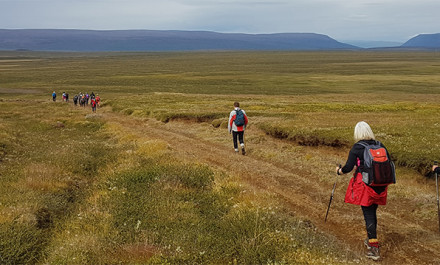- Study
- Student
- Research
- About UNAK
- University
- Schools & faculties
- Governance
- Rector
- Rector’s Office
- University Council
- University Assembly
- University Office
- Laws and regulations
- Organization
- Code of Ethics
- Councils and committees
- Strategies & policies
- On campus
- Human resource
Health and well-being in Northern Iceland in community dwelling Icelandic people age ≥ 65 years

About the project
Project title: Health and well-being in Northern Iceland: Does residency, urban or rural, affect health and well-being in community dwelling Icelandic people age ≥ 65 years?
The fastest growing population is older adults. According to population projections it is expected that in the year 2065, over 20% of all Icelanders will be ≥ 65 years and greater proportion of residents are ≥ 65 years in rural areas. Previous studies have shown that residents in rural areas in Iceland have less education, lower income, more health problems or diagnosed diseases and greater depressive symptoms compared to urban residents. The frequency of diseases in older adults is high and costly. There is a lack of research of older adults and those living remotely.
The project is a cross-sectional study. The main aims of the project, are to look at health and well-being in older adults with specific emphasies on health literacy, physical activity, risk for development of diabetes and mental well-being. Nine validated instruments will be use. They measure for example, physical activity, physical and mental health, resilience, sessional affective disorders, health literacy, use of alcohol and a screening instrument that measures risk of development of type 2 diabetes (FINDRISC) will be used. Objective markers in terms of physical measurements, as blood pressure, body mass index, waist circumference and selected biomarkers (vitamin D), increases the originality of the results. The sample was stratified and randomly selected from the national registry, according to community dwelling ≥ 65 year adults, place of residency rural/urban, age and gender. The older adults are living in urban, rural and remote parts of Northern Iceland.
The aim is also to compare the results to a similar project in northern Finland and Norway.
Members
Árún K. Sigurðardóttir, Professor, School of Health Sciences, University of Akureyri, Iceland
Sonja Stelly Gústafsdóttir, Assistant professor, School of Health Sciences, University of Akureyri, Iceland
Elín Díanna Gunnarsdóttir, Assistant professor, School of Humanities and Social Sciences, University of Akureyri, Iceland
Gísli Kort Kristófersson, Assistant professor, School of Health Sciences, University of Akureyri, Iceland
Sólveig Ása Árnadóttir, Associate professor, School of Health Sciences, University of Akureyri, Iceland
Stefán B. Sigurðsson, Professor, School of Health Sciences, University of Akureyri, Iceland
Satu Elo, Associate professor, University of Oulo, Finland
Ingela Christina Enmarker, Professor II, North University, Norway
Students working at the project:
Alma Dröfn Vignisdóttir
Pála Sigríður Tryggvadóttir
Sigríður Atladóttir
Telma Ýr Sigurðardóttir
Collaborators
University of Iceland, Iceland
University of Oulo, Finland
North University, Norway